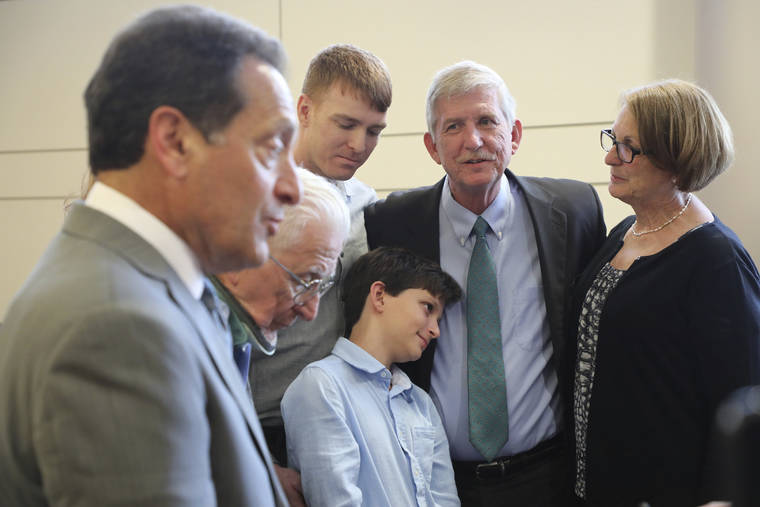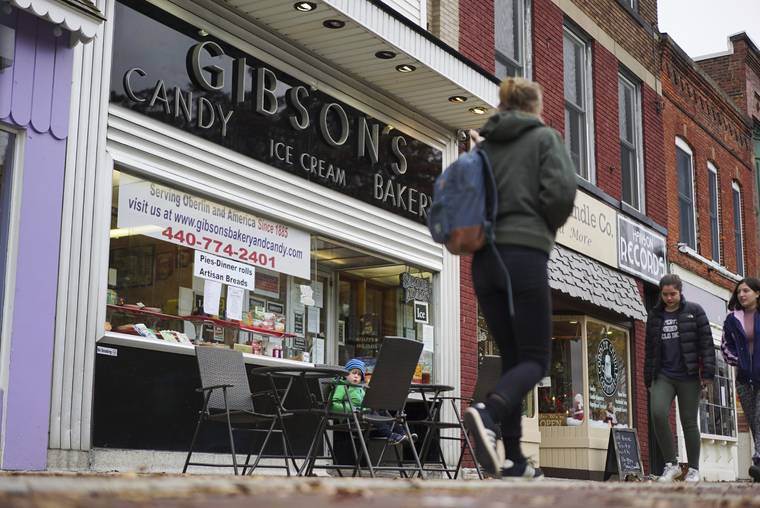CLEVELAND – An Ohio college ordered to pay $44 million in damages to the owners of a market who said the school ruined their business by branding them as racists after a black student was caught shoplifting said Friday the jury awards are “not the final outcome.”
“We are disappointed in the jury’s decisions and the fragmentary and sometimes distorted public discussion of this case,” Oberlin College President Carmen Twillie Ambar wrote in a letter to faculty, students, parents and alumni. “But we respect the integrity of the jury, and we value our relationship with the town and region that are our home. We will learn from this lawsuit as we build a stronger relationship with our neighbors.”
Ambar’s letter said the verdicts are “just one step along the way of what may turn out to be a lengthy and complex legal process.”
David Gibson told the Elyria Chronicle-Telegram the awards are a “clear vindication” for his family, their business and their reputations.
Oberlin College has long been a bastion of idealism. It began admitting black people and women in the 1830s, became a center for the abolitionist movement, and served as a stop on the Underground Railroad for slaves fleeing the South. Its graduates include playwright Thornton Wilder, author Sinclair Lewis, singer Liz Phair, actor John Cazale and actress Lena Dunham.
But in the last four or five years, it has been the subject of attention that alumni consider to be unflattering and red meat for conservatives who view liberal arts colleges as epicenters for political correctness gone amok. National stories have detailed Oberlin student complaints about the cultural appropriation of cafeteria food and an assistant professor who on Facebook suggested that “Zionists” were involved in a plot to bring down the World Trade Center towers on September 11.
Then, in November 2016, students along with some Oberlin staff began gathering in front of Gibson’s Bakery to protest what they called store’s longtime racist policies after the arrest of three black students. A police report said one of the students was confronted by Allyn Gibson, who is white, after stealing wine. The confrontation turned physical and the students punching and kicking Gibson as he lay on the ground, the report said.
The student caught shoplifting was initially charged with robbery. All three students later pleaded guilty to misdemeanors and read statements in court saying Allyn Gibson’s actions that day weren’t racially motivated.
The protests, flyers posted around the school denouncing the Gibsons, and a decision by Oberlin Vice President Meredith Raimondo, a defendant in the lawsuit, to end Oberlin’s longtime commercial relationship with Gibson’s, sent the business into an economic freefall, the lawsuit said. Oberlin eventually resumed its relationship with the market but ended it once again when the Gibsons filed suit in November 2017.
Some alumni are dismayed.
Jerry Helfand, a 1976 Oberlin graduate and commodities trader living in St. Paul, Minnesota, told The Associated Press on Friday that news about Oberlin has been “brutal.” Helfand’s wife and daughter also are Oberlin graduates.
“I’m shocked and disappointed by the verdict, and very concerned with the way it was handled by the college,” Helfand said. “It’s obvious they misjudged their relationship with Gibson’s and mishandled it.”
Helfand said he is rethinking the annual rite of sending checks to the school that sent him into the world.
“We’ve given for a very long time,” Helfand said. “My wife and I will be talking about it.”
Lynn Pasquerella, president of the Association of American Colleges and Universities and a former president at Mount Holyoke College in Massachusetts, dismissed the narrative that liberal colleges are “brainwashing” students and not relevant anymore. But she said Oberlin does need to reconnect with those living and working outside its walls.
“They need to restore trust, and that requires being present in the community and listening to the real concerns people are having about what Oberlin is doing,” she said.



